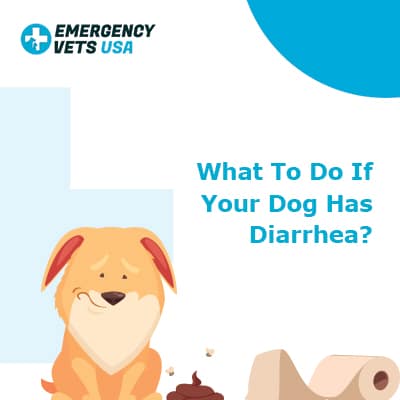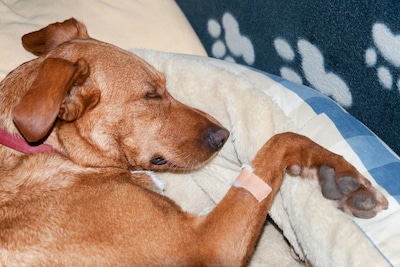What To Do If Your Dog Has Diarrhea And Is Acting Normal
It can be unnerving to see your dog have diarrhea, especially when you aren’t sure what to do about it.
Sometimes, it can also be frustrating if your dog is having diarrhea that gets stuck in their fur.
Or maybe they are having accidents in the house that you have to keep cleaning up.
In this article we will discuss some of the causes of diarrhea, things you can do at home that may help if your dog is otherwise acting fine, and when to take your dog to their veterinarian.
In most cases diarrhea isn’t a reason to see an emergency vet.
10 Causes of Diarrhea In Dogs
Diarrhea in dogs can be caused by many different things, some of which are listed below:
- Dietary indiscretion
- Food intolerance
- Stress
- Intestinal parasites
- Food allergies
- Inflammatory Bowel Disease
- Autoimmune diseases
- Intestinal bacterial overgrowth
- Liver disease
- Cancer
- Parvovirus
Dog Has Diarrhea But Acting Normal and Eating?
It is very common for dogs to get into things, taste things, and swallow things that can irritate their intestines.
This can range from something they found outside, to another animal’s stool, to a plant that is irritating their intestinal tract.
Even a food item that they can’t digest very well can lead to diarrhea.
So if your dog has diarrhea but acting normal and eating just fine, there may be nothing to worry about.
For the most part, diarrhea caused by dietary indiscretion can improve on its own with the remedies mentioned below.
Stress can also cause dogs to have diarrhea.
If your dog has recently gone through a stressful event, such as a move, a long ride in the car, a fight with another dog, they can develop diarrhea.
Oftentimes, it will improve on its own with the remedies discussed below, but if they develop blood in their stool, definitely give your veterinarian a call, as prescription medications may be needed.
The other items on the list above are more severe causes of persistent, chronic diarrhea, which would need to be tested for by your veterinarian if your dog’s diarrhea isn’t improving with home remedies or with prescription medications.
Emergencies are cases where your dog has had diarrhea for a few days, isn’t getting better and is having troubles keeping liquid or food down.
Just like a human, if you can’t keep liquid down you become dehydrated which can then lead to an emergency.
If you find your dog become very lethargic give your regular veterinarian a call, they may refer you to an Animal Hospital in your area if they cannot get you in quickly.
At Home Remedies For Diarrhea

If your dog has diarrhea but is otherwise acting normal, is eating fine, drinking well, and not vomiting, it is perfectly fine to wait it out for two to three days to see if it improves on its own.
There are some things you can do that may help your dog’s stool firm up.
Add Pumpkin To Their Diet
You could add some canned pumpkin to their meals, which is a good source of fiber that can sometimes help with diarrhea.
If your dog is small to medium sized, you can give them 1-2 teaspoons of canned pumpkin with each meal.
If your dog is on the larger side (more than 50 pounds), you can supplement their meals with 1 tablespoon of canned pumpkin.
Decrease Regular Food By Half
You can decrease the amount of their regular food you are feeding them by half.
This will help their digestive system have a little break.
You can also cook them a bland diet, consisting of baked or broiled chicken breast.
Lean hamburger meat with boiled pasta or rice also helps.
Just make sure there is no added flavoring or spices and the meat is cooked thoroughly and is not fatty.
Do this for 2-3 days and then gradually transitioning them back to their normal amount of food.
Over the course of one week this will usually help improve their stool quality.
If you prefer to not cook for them, you can check with your veterinarian’s office to see if they have any prescription canned sensitive stomach foods.
Foods with probiotics can also help with diarrhea problems.
Most vets will have special foods you can buy directly from them to help with diarrhea.
When Should You Go See Your Veterinarian For Diarrhea?

If your dog’s diarrhea remains after trying the suggestions above, and your dog is still acting and eating fine, it would be a good idea to collect a stool sample and take it in to your veterinarian’s office so they can check it for parasites.
They will need a recent sample of stool so make sure you are able to get to your vet’s office soon after you have collected the sample.
If parasites are present, they can provide you with a de-wormer to give to your dog that can help.
Make sure to read the directions closely and to follow up with any recheck stool tests or recheck de-wormings that they recommend, as well as adhere to any decontamination procedures they may recommend for preventing your dog from re-infecting himself.
When Can Diarrhea Lead To Emergency Care?
If at any time your dog begins vomiting, acting lethargic (very tired, having no energy), refuses food, or having blood in their stool, it is time to schedule an appointment with your veterinarian.
Your veterinarian can examine your dog and based off of the history and exam, talk with you about whether further diagnostics, such as blood work or x-rays, should be performed, or if they can give you prescription medications that can help your dog feel better and get back to their normal self.
In most cases your general veterinarian should be able to run these test, which will cost less than taking your dog to an Animal Hospital.
This is also important to make sure your dog does not get dehydrated and if your veterinarian assesses that they are, they can provide them with injectable fluids to help improve their hydration.
If at any time you are concerned or have any questions, always call your veterinarian’s office for recommendations.

Leslie Brooks graduated from the University of Tennessee College of Veterinary Medicine in 2012. After graduation she moved to Indianapolis to do an intensive one-year internship at a specialty practice and then began working as a small animal general practitioner. She ran her own house call practice for three years, visiting pets in people’s homes. Currently, she works part time in clinical practice and volunteering her free time to serve pets of the homeless. Read more about us here.
